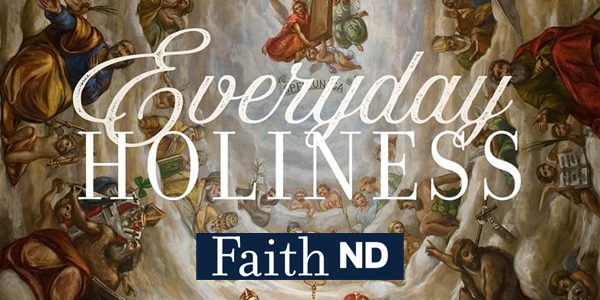INTRO:
Hi. I’m Fr. Lou DelFra,
Director of Pastoral Life for the Alliance for Catholic Education
at the University of Notre Dame.
Welcome to Grace Period,
a weekly series of audio reflections designed for you…
to help you pause,
in the midst of the stresses of these days,
listen for God’s voice in your lives,
and begin anew.
___
Last week, we entered a Gospel version of the Noah and the flood story,
The disciples caught in a storm on the Sea of Galilee.
We witnessed their fear, and explored some of our own fears that have come with living through this pandemic.
And we tried to open ourselves to Jesus’ reassuring words:
“Take courage! It is I. Do not be afraid.”
These words, “Do not be afraid” are Jesus’ single most oft-repeated words in all the Gospels, which tells us something about the nature of evil. Its most persistent manifestation in our lives is fear.
For us, who are called to be signs of hope to people living in the midst of fear:
How do we get those words out of our own mouths – “do not be afraid” – how do we embody courage to our students, our colleagues, our friends when we aren’t Jesus and can’t ourselves calm the storm?
And this, I think, is part of the beauty of Matthew’s version of this story,
Which includes this amazing interchange between Jesus and Peter.
Peter, as we all know, is SO human, which is to say, SO flawed (which is why I like him so much)
Suffering lapses in judgment, wayward impulses, and shocking cowardice at critical moments, almost chapter by chapter throughout the Gospels.
But this only makes him that much more relatable to us.
And for all his flaws, Peter takes the Noah story to a new, and dynamically Christian, level:
Think about it: Noah looks out, sees only water, but, filled with hope, sends out a dove.
Peter looks out, sees water, but filled with Christ, sends out what? Himself.
Peter himself walks courageously into the crisis, knowing there is something – or, rather, someone – at work that is more powerful than the storm.
And, yes, it’s really important to say Peter does so imperfectly – at points, his fear gains the upper hand, and he begins to sink.
But even then, he does not lose sight of the source of his hope, and calls out, “Lord, save me!” It’s a call of hope, not despair. He knows there is one in the storm who is greater than the storm.
And I try to imagine the other disciples in the boat, looking at Peter as he goes through this, and I think of your colleagues and students and staff and friends watching you as you walk the waves of this pandemic, and I can’t help but think: when you watch someone filled with hope do difficult things, aren’t you yourself more emboldened to rise up to the challenge?
This is why our daily routines are so important, the ones that remind us that Christ is with us on the journey through the storm,
That help us, like Peter, never take our eye off Christ – even and especially – when we’re sinking.
Whether this is the Eucharist, reading Scripture, our daily prayers
— what are the things that keep YOU centered on the presence of Christ?
Let’s recommit to them in these days, for they keep us focused on Christ, the source of our hope.
OUTRO:
Join us next week, as we ask the question: “But what do we do if we lose sight of Jesus or feel he is absent in our crisis?



